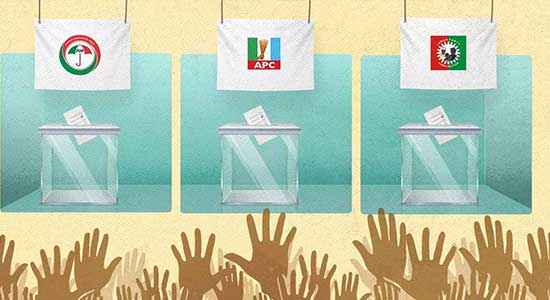
The Court of Appeal, Abuja on Tuesday adjourned till Wednesday for ruling in an application by the Independent National Electoral Commission (INEC) seeking to vary the court’s order for inspection of materials used for the conduct of the February 25 presidential election.
Justice Joseph Ikyegh, who led a three-member panel of the Court of Appeal, announced the date for ruling shortly after lawyers representing parties in the suit adopted and argued their briefs of argument for and against the motion.

INEC had on March 4 approached the appellate court for an order giving it leave to reconfigure the Bimodal Voter Accreditation System (BVAS) used for the presidential and parliamentary elections.
The electoral umpire explained that the reconfiguration is to enable it deploy the BVAS for the forthcoming governorship and state Houses of Assembly polls.

INEC, through its lawyer, Mr Inuwa Tanimu (SAN), in urging the court to grant its request, told the court that the defendants have nothing to fear, since the information that would be wiped out during reconfiguration would be stored and kept save in its server in the cloud.
Tanimu, who noted that time is not on the electoral umpire’s side, pointed out that if the earlier order is not varied, it may affect the conduct of the March 11 governorship election.
However, in their opposition to the granting of the varying order, Chief Onyechi Ikpeazu and Chief Emeka Etiaba both Senior Advocates of Nigeria (SAN), representing Peter Obi and Atiku Abubakar respectively, argued that if the order is varied, vital information needed in proving their case would be wiped out.
According to Ikpeazu, the real figure of accredited voters can only be gotten from the BVAS, adding that if the BVAS are tampered with in the name of reconfiguration, vital information would be lost.
In addition, the senior lawyer argued that the March 11 elections can be postponed if situation warrants so.
He accordingly urged the court to dismiss the application of the Commission.
Meanwhile, Ikpeazu prayed the court to grant his client’s permission to conduct a physical/digital forensic inspection of the presidential electoral materials, as well as an order directing INEC to issue him a Certified True Copy (CTC) of registered voters and polling units results.
He argued that the request was to ensure that evidence are preserved before they are wiped out, noting that information on the INEC server vary from day to day, adding that it was not until information was gotten from the BVAS that they were able to prove that there was no incidence of over-voting in last year’s governorship election.
The candidates of the Peoples Democratic Party (PDP), Atiku Abubakar and the Labour Party (LP), Peter Obi, in their protest against the outcome of the presidential election, obtained an order of court to inspect the materials used in the conduct of the poll, including the BVAS.
INEC had declared the candidate of the All Progressives Congress (APC), Asiwaju Bola Tinubu, winner of the presidential election having scored the highest number of votes cast in the election.
Tinubu polled over eight million votes to emerge victorious, while Atiku came second with nearly seven million votes and Obi third, with a little above six million votes.
Similarly, both Tinubu and Atiku won 12 states each, while Obi won 11 states and the Federal Capital Territory (FCT).
Dissatisfied with the declaration of Tinubu as winner of the presidential election, both Atiku and Obi vowed to ventilate their grievances at the Presidential Election Petition Tribunal, which is the court saddled with the responsibility of hearing and determining cases surrounding the conduct of presidential election.
While they are yet to file their respective petitions, Atiku and Obi in separate motion exparte sought for an order of court permitting them to inspect the materials used for the February 25 presidential election.
The order, according to them, is to enable them gather the evidence needed in proving allegations of non-compliance and rigging of the poll.
Both Atiku and Obi are claiming that they secured the highest number of votes cast in majority of the states and ought to be declared winner, accusing INEC of manipulating the process to favour the ruling APC and its candidate, Tinubu.
After listening to their respective applications last Friday, Justice Ikyegh made an order permitting Atiku and Obi to inspect “All the electoral materials used in the conduct of the election for the office of the president of the Federal Republic of Nigeria held on February 25, 2023”.
The court also permitted them to do electronic scanning and/or make photocopies of Voter’s Registration, ballot papers used in the presidential election.
In addition, both Atiku and Obi are by the order permitted to “carry out digital forensic inspection of BVAS machines used for the conduct of the February 25” presidential election.
Meanwhile, the court would also on Wednesday rule on the applications of the APC and Tinubu, praying the court to allow them also carry out similar inspection of electoral materials used for the February 25 presidential election.
Credit: The Nigeria Lawyers
